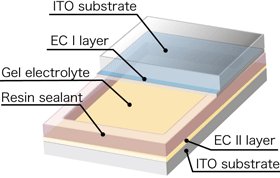May 20 2010
Hisashi Tanaka and Tohru Kawamoto of Molecular Nanophysics Group, Nanotechnology Research Institute, the National Institute of Advanced Industrial Science and Technology, in collaboration with Yamagata University, have succeeded in producing gel electrolytes for use in a light-control glass device using nanoparticles of Prussian blue-type complexes.

The light-control glass device is based on the electrochromism phenomenon, and its color can be controlled between blue and transparent states by application of an electric current. As nanoparticle-containing electrochromic layers, a gel electrolyte layer, and a sealant could be fabricated by application processes, simplified manufacturing processes will permit the efficient production of large-area light-control glass devices at a low cost. Adoption of the gel electrolyte would reduce the possibility of leakage of the electrolyte, should the device be damaged. Furthermore, the new light-control glass has a nonvolatile property and the color remains unchanged when the power supply is switched off.
Gelation of an electrolyte generally decreases its ion conductivity, thereby reducing the operating speed of electrochromic devices incorporating the gel electrolyte. By optimizing the combination of materials used and their formulation, we succeeded in producing a gel electrolyte that retains its response rate. Furthermore, the use of a combination of a plastic gel electrolyte and a resin substrate (polymer film) enables the production of flexible electrochromic devices.
If titanium oxide powder or other white particulate material is mixed into the gel electrolyte, the device can display only a color change on one side of the device. Such devices with a nonvolatile property could be used as energy-saving display units including electronic paper.